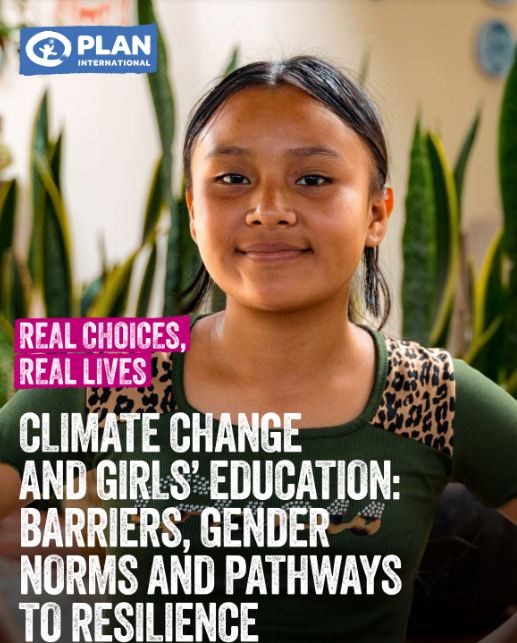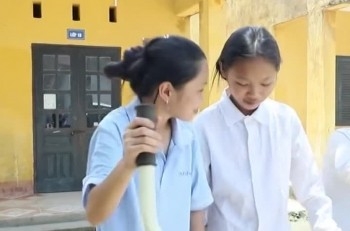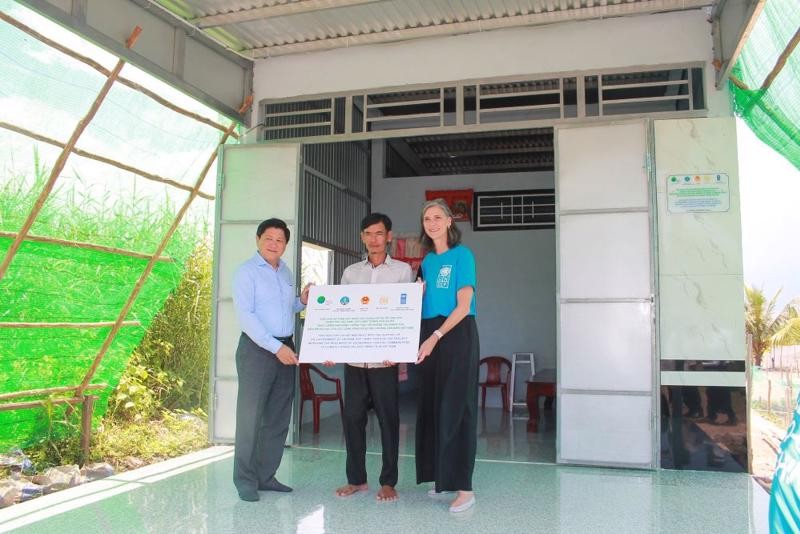Report: Climate Crisis Seriously Affects Girls' Education
Since 2006, Plan International’s Real Choices, Real Lives study has been following a cohort of girls and their families from nine countries in three regions.
This unique longitudinal and qualitative study conducts annual data collection with girls and their caregivers, offering valuable insights into experiences of girls during childhood and adolescence, including the decisions and realities that shape their lives.
In the latest report, "Climate Change and Girls' Education: Barriers, Gender Norms and Pathways", the results show how extreme weather events, damaged school infrastructure, and impassable routes to schools are causing significant disruptions to girls' access to quality education in West Africa, South and Central America, the Caribbean, and Southeast Asia.
 |
| Report: Climate Crisis Seriously Affects Girls' Education |
It explores the relationship between climate change and girls’ education: What are the direct and indirect impacts of climate change on girls accessing school and completing their education? How do these impacts intersect with existing gendered barriers to education? And how is their education supporting girl to respond and adapt to climate change in their communities?
Girls directly about their experiences of climate change, their ideas for mitigation and adaptation. They are demanding safer schools, improved climate change curriculum, and better conditions for climate change adaptation and education.
The new report shows girls are missing school because of direct impacts of climate change. Their schools are damaged by extreme weather events, closed for repairs in the aftermath, or inaccessible due to damaged or obstructed roads and pathways.
These disruptions not only jeopardize girls' immediate access to schooling but also have far-reaching, long-term consequences, including increasing the risk of harmful practices like child marriage, gender-based violence, and early pregnancies.
Also, "Climate Change and Girls' Education: Barriers, Gender Norms and Pathways to Resilience" shows the dire consequences of the climate crisis on girls' education.
Girls often find themselves shouldering additional household responsibilities or seeking employment outside their homes due to prevailing gender norms and poverty, resulting in disruptions to their education.
Climate-related disruptions intensify gender norms
However, in regions vulnerable to the climate crisis, girls face even more formidable challenges. Climate-related disruptions intensify gender norms, leading to increased domestic responsibilities, reduced study time, and heightened financial burdens, making it difficult for both girls and their parents to afford education.
“There are children who sometimes have to cross rivers, when the river is overflowing…they can’t cross because of the current”, said Stephany, a 17-year-old girl participating in the study from El Salvador.
Meanwhile, Reyna, a 16-year-old girl from the Philippines added, “As a daughter of a farmer and a young farmer myself, I know how it is when our crops suffer losses. I had to miss my classes and sometimes, I cannot eat because the product is damaged due to bad weather”.
Ahead of the 28th Conference of the Parties (COP28) scheduled to take place from November 30 to December 12, Plan International is calling on governments, donors, and civil society to support girls’ education in response to the climate crisis through this report.
This urgent call to action is underscored by the sobering estimate from the Malala Fund, which warns that climate change will trigger the abrupt end to schooling for at least 12.5 million girls in 30 climate-vulnerable countries every year.
Key recommendations
Key recommendations include Secure safer schools, Revamp climate education, Empower girls in decision-making, Finance girls' climate education, and Change social norms for girls' education.
“Girls’ voices on their experiences of climate change are vital to understand both how their education is threatened by climate change and in turn how their education has developed their climate adaptation skills so far. This report puts forward the case for ensuring girls’ voices and realities are meaningfully included in any climate change action; by bearing the brunt of much climate change loss and damage, girls are uniquely placed to have a key role in a climate-resilient and gender-just world”, said Keya Khandaker, Research Engagement Officer for Real Choices, Real Lives at Plan International.
17-year-old Yen from Vietnam, shared that she participates in many environmental protection activities and comes to the conclusion that environmental pollution greatly affects the climate.
Plan International's latest report offers important insights for policymakers, educators, and organizations interested in the relationship between the climate crisis and girls' education. This report aims to provide a clearer understanding of this issue and its implications for the future.
It recommends that addressing this challenge should lead to improved access to education for girls and equip them with essential skills to tackle the climate crisis.
 | UNICEF: Vietnam Narrows Gender Digital Divide Vietnam is among four countries demonstrating gender parity in digital skills, according to a new UNICEF analysis which was issued on International Day of Girls ... |
 | More Youth Clubs for Breaking Gender Stereotypes The Ambassador of Plan International Germany arrived in Hanoi and participated in a Gender Equality Summer Camp - a communication event initiated by Champions Of ... |
 | School Girl Given Opportunities for Change by ChildFund's Project Since taking on the role of the lead tenant in her school's semi-boarding house, Hoa - an 11-year-old girl from Cao Bang has had many ... |
Recommended
 World
World
Pakistan NCRC report explores emerging child rights issues
 World
World
"India has right to defend herself against terror," says German Foreign Minister, endorses Op Sindoor
 World
World
‘We stand with India’: Japan, UAE back New Delhi over its global outreach against terror
 World
World
'Action Was Entirely Justifiable': Former US NSA John Bolton Backs India's Right After Pahalgam Attack
 World
World
US, China Conclude Trade Talks with Positive Outcome
 World
World
Nifty, Sensex jumped more than 2% in opening as India-Pakistan tensions ease
 World
World
Easing of US-China Tariffs: Markets React Positively, Experts Remain Cautious
 World
World


